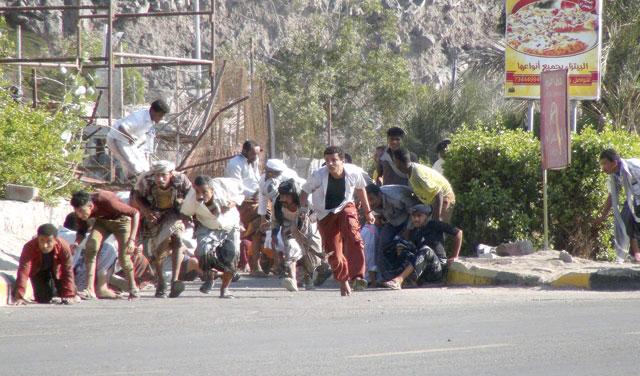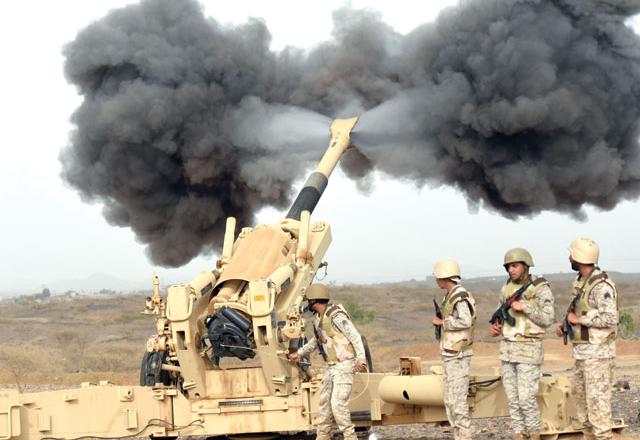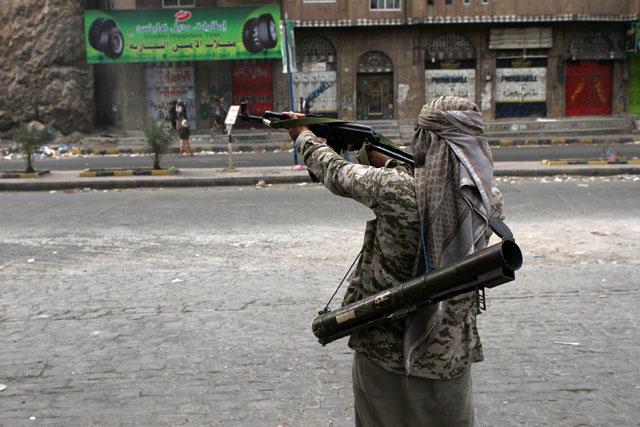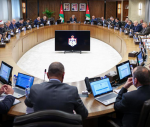You are here
Yemeni leader Hadi leaves country as Saudi Arabia keeps up air strikes on Houthi rebels
By Reuters - Mar 26,2015 - Last updated at Mar 26,2015
SANAA/ADEN — Yemen's President Abed Rabbo Mansour Hadi left his refuge in Aden under Saudi protection on Thursday and arrived in Saudi Arabia as Houthi rebels battled with forces still loyal to him on the outskirts of the southern port city.
Throughout the day, warplanes from Saudi Arabia and Arab allies struck at Houthi forces, who have taken over much of the country in their campaign to oust Hadi.
The Saudi-led military intervention marked a major escalation of the Yemen crisis, in which Iran supports the Shiite Muslim Houthis, and Sunni Muslim monarchies in the Gulf back Hadi and his fellow Sunni loyalists in Yemen's south.
Iran denounced the surprise assault on the Houthis and demanded an immediate halt to Saudi-led military operations.
Tehran also made clear Saudi Arabia’s deployment of a Sunni coalition against its Shiite enemies would complicate efforts to end a conflict that will only inflame the sectarian hatreds already fuelling wars around the Middle East.
But Hadi’s departure from Aden, where he had holed up since fleeing the Houthi-controlled capital Sanaa in February, could also be a turning point.
Saudi state television channel Al Ekhbariya said Hadi had arrived in the Saudi capital Riyadh on Thursday. Saudi-owned al Arabiya television said he would go onto the Eyptian Red Sea resort of Sharm El Sheikh to attend an Arab summit on Saturday.
Mohammed Marem, the director of Hadi’s office, confirmed he would attend the Sharm meeting in person, dropping his original plan to address other Arab leaders via a closed-circuit television link.
“In light of the events and developments that have happened since dawn, he has decided to attend the summit and participate in person,” Marem told Reuters.
But it was not certain if Hadi would be able to return to Aden.
On the city’s northern outskirts, Houthis and allied troops fought gun battles with militiamen loyal to Hadi. Thirteen pro-Houthi fighters and three militiamen were killed.
Pro-Hadi fighters retook Aden airport, a day after it was captured by Houthi forces advancing on the city. The facility remained closed.
Major gamble
The Saudi move was a major gamble by the world’s top oil exporter to check Iranian influence in its backyard without direct military backing from Washington.
“We will do whatever it takes in order to protect the legitimate government of Yemen from falling,” Saudi Arabia’s ambassador to the United States, Adel Al Jubeir, told a news conference in Washington.
In Sanaa, which the Houthis seized in September, warplanes bombed the main airport and al Dulaimi military air base, residents said, in an apparent attempt to weaken the Houthis’ air power.
A Reuters witness said four or five houses had been damaged. Rescue workers put the death toll at 13, including a doctor pulled from the rubble of his clinic.
In a day of attacks, warplanes struck Houthi fighters near Yemen’s border with Saudi Arabia, tribal and Houthi sources said. There was also heavy street fighting in Houta, north of Aden, in which five pro-Houthi fighters and four militiamen were killed.
Thousands of Houthi supporters gathered to condemn the air strikes at the gate to Sanaa’s old city, waving Houthi banners and chanting, “Death to America!”
Al Arabiya said Saudi Arabia was contributing 100 warplanes to operation “Storm of Resolve” and more than 85 were provided by the United Arab Emirates, Qatar, Bahrain, Kuwait, Jordan, Morocco and Sudan.
Jordan and Sudan said their forces were involved in the operation. Egyptian air forces were participating and four naval ships headed to secure the Gulf of Aden. Turkey said it may provide logistical support to the Saudi-led operation.
Pakistan’s Prime Minister Nawaz Sharif’s said any threat to Saudi Arabia would “evoke a strong response” from Islamabad.
Pakistan — which borders eastern Iran — was considering a Saudi request for troops to send to Yemen, Islamabad said.
A Saudi official familiar with defence matters told Reuters that a “land offensive might be needed to restore order”.
Arab foreign ministers agreed at a meeting in Egypt on Thursday on a draft resolution to form a unified Arab military force, Egyptian state TV said. Its role would be as a rapid interventon force.
Russia’s President Vladimir Putin called for an immediate cessation of military activities in Yemen in phone conversations with Iran’s President Hassan Rouhani, the Kremlin said.
US Secretary of State John Kerry raised the topic of Yemen on Thursday with his Iranian counterpart before turning to nuclear negotiations in Lausanne, Switzerland, a State Department spokesman said.
Meanwhile, Iran’s Foreign Ministry demanded an immediate halt to the “aggression and air strikes” in Yemen.
“Military actions in Yemen...will further complicate the situation,” ministry spokeswoman Marzieh Afkham said, quoted by Fars news agancy.
A senior Iranian official told Reuters: “Iran will use all possible political ways to allay tension in Yemen. Military intervention is not an option for Tehran.”
A United Arab Emirates official expressed Gulf Arab concerns about Iranian influence in Yemen.
“The strategic change in the region benefits Iran and we cannot be silent about the fact that the Houthis carry their banner,” the UAE Minister of State for Foreign Affairs Anwar Mohammed Gargash said.
While the advance against Hadi has been publicly led by the Houthis, many Yemenis believe the real instigator of their campaign is former president Ali Abdullah Saleh, a critic of Hadi who retains influence in the army.
Riyadh accuses Iran of stirring up sectarian strife throughout the region and in Yemen with its support for the Houthis. Iran publicly denies funding and training the Houthis.
Ambassador Jubeir said the assaults were in response to a request by Hadi.
Washington said it supported the operation and had authorised US logistical and intelligence support.
US forces were not involved in direct military action in Yemen. France and Britain also backed the operation but the European Union said military action was not a solution.
A Houthi leader said the air strikes would set off a “wide war” in the region.
Houthi-run Al Masirah television said the strikes had hit a residential neighbourhood north of Sanaa and caused dozens of casualties.
Al Masirah showed the body of a girl and several of the wounded, including a weeping man who said the strikes had killed his son and destroyed his home.
A widening Yemen conflict could pose risks for global oil supplies and oil prices surged more than 4 per cent on Thursday.
Yemen closed its main ports. But the US military said it would help ensure the Bab Al Mandeb strait at the tip of the Red Sea remains open.
Related Articles
Houthi militia forces in Yemen backed by allied army units seized an air base on Wednesday and appeared close to capturing the southern port of Aden from defenders loyal to President Abed Rabbo Mansour Hadi, residents said.
Aid agencies warned Monday of a growing humanitarian crisis including food shortages in Yemen as Saudi-led warplanes hit rebel positions for a third week and rival forces clashed.
Clashes between rebels and pro-government forces and Saudi-led air strikes killed at least 60 people in Yemen, medics and military sources said Sunday, after Riyadh pledged to fund a UN aid appeal.


















